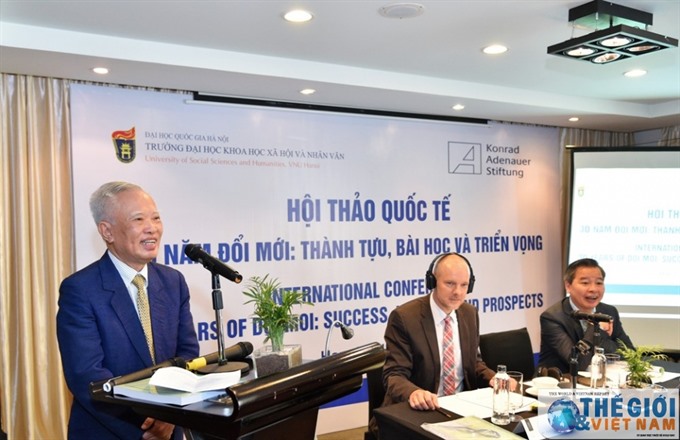 Politics & Law
Politics & Law

Scholars called on the Party and the Government to urgently initiate a second Đổi mới (renewal) period to meet the new demands of the country’s development, economically and politically.
 |
| Former Deputy Prime Minister Vũ Khoan delivers speech at an international conference on the 30th anniversary of Đổi mới held on Friday. — Photo baoquocte.vn |
HÀ NỘI — Scholars called on the Party and the Government to urgently initiate a second Đổi mới (renewal) period to meet the new demands of the country’s development, economically and politically.
Đổi mới, officially begun in 1986, changed Viet Nam’s post-war Soviet-style subsidised economy into a market-oriented one. The thirty-year long process led to an economic boom in the war-torn country with average growth rates up to eight per cent.
“After years of economic collapse and suffering of the consequences of war, the Vietnamese Government liberated the market and opened it for the international economy,” said Stefan Kaufmann, member of the German Parliament at an international conference on the 30th anniversary of Đổi mới held on Friday. It was organised by the University of Social Sciences and Humanities (USSH), Hanoi and Germany’s Konrad Adenauer Stiftung.
“What happened ever since has been, what we Germans like to call a ‘Wirtschaftswunder’ – an economy miracle,” he said.
From a country with inflation at 700 per cent and more than 70 per cent of people living in hunger and poverty, Viet Nam transformed into a middle income country with GDP per capita of US$1042. It also integrated into the global economy by becoming an active member of international organisations and at least 17 free trade agreements (FTAs).
The Southeast Asian nation, however, was now paying for its mistakes during the reform process, said former Deputy Prime Minister Vũ Khoan, who witnessed the first days of Đổi mới.
Viet Nam had to face a colossal national debt, already at VND3 quadrillion (US$135.2 billion) surpassing the red line of 65 per cent of national GDP, enormous budget overspending and a sub-par economy driven by inefficient State-owned enterprises.
“But these were only short-term consequences,” Khoan said.
“When the world is already talking about the fourth industrial revolution, Viet Nam is still at the first industrial revolution stage. It is this challenge that Viet Nam has to address through institutional transformation or face much bigger problems in the future”.
Economist Lê Đăng Doanh, member of the United Nations Committee for Development Policy, agreed that Viet Nam had to carry out a comprehensive reform of its “deformed market-oriented model”.
“A second Đổi mới is urgently in demand,” he said.
Political Đổi mới
The new Đổi mới should also focus on fundamental changes in the Government, and Communist Party, which has ruled Việt Nam since the country was established.
The new Đổi mới would bring major changes in the political system, he said, though many from the outside might think that there was little reform in the Party, Khoan said.
“The economic reforms initiated by the Party already said a lot,” he said. “The Party used to intervene in every matter of the country, but no longer does so. It now gives up a lot of power to the National Assembly (NA) – the legislative body – and the Government”.
The USSH headmaster Pham Quang Minh said that the country underwent a “political liberalisation” since Đổi mới, in which the role of the NA representing Vietnamese grassroots was strengthened.
“It (the NA) is no longer rubber-stamping legislation since the introduction of the question hours – hearings for the Government cabinet to justify their actions to the NA, as well as the confidence vote and the passing of the new Constitution in 2013, he said.
In order to push for further political reform, Khoan believed that the top priority was to “refresh the Party”.
“If the Party can’t renew itself, it’s hard to think about renewing the whole of society”, he said. — VNS